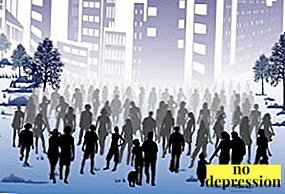Society is extremely influential on the formation of personality. Each person, in many respects, determines how he will think what he will give preference to, how he will build his life.
Because human civilization is actively developing, society’s views on certain events and phenomena may change significantly over several decades.
Social norms are also being adjusted, only some installations remain practically unchanged: do not kill, do not steal, and the like. Effects violations of social norms depend on the severity of the offense.
What is social norms?

Social norms - these are the rules of behavior formed in the process of development of human society.
They allow individuals and groups of people to better interact with each other, provide security and comfort, reduce the number of conflict situations.
Some social norms not accepted by various social groups, criticized (and it may well be sensible), but the bulk of the rules is generally accepted.
Every country has its own social norms. In developed countries, the differences are extremely subtle and are usually associated with the rules of etiquette and differences in the interpretation of certain actions and movements.
For example, a fig in Brazil is a positive gesture, which is used to wish good luck and protect it from the evil eye. But if you show this gesture in Turkey, you can get into trouble: it is considered a sign of aggression and rudeness, equivalent to a demonstration of the middle finger.
If compare the norms of developed and weaker countries, the differences will be extremely significant: the same phenomenon in one country may be the norm, and in the other - a cognizable case, which is the reason for the death penalty.
Differences in attitudes toward one or another social norm can be traced at all levels, even in very small communities.
For example, members of one family extremely meticulously follow etiquette, and members of another try to stick to it only if when it is really necessary. In any social group there is a set of norms, rules, clearly marked or fairly vague.

At the same time, there are many who openly violate the norms of behavior prevailing in society for various reasons.
Reaction of others (including the actions of power structures) depends on the severity of the offense. Not every disregard for social norms is a crime.
For example, if a person, being in a group of unfamiliar people, decides to squeeze a tea bag with his fingers, this will be a violation of social norms, in particular etiquette, but no one will call the police, unless people laugh at this or comment negatively.
Social norms are religious attitudes, rites, traditions, and laws of a particular country (region, state), and stereotypes, and morality, and habits.
Causes of violation
The main reasons for the violation of social norms:
- The desire to gain. This benefit can be any: getting finances, valuables, a better place, the location of someone, the pleasure of murder, rape, and so on. As a rule, it makes sense to talk about benefits when global social norms are violated, which are included in the criminal code.
- Provocation; disagreement with established rules. Various groups of people, organizations hold provocative actions that directly or indirectly violate established social rules. For example, the activity of the Pussy Riot group, which has repeatedly become the cause of a huge public response (both negative and positive, but mostly negative in Russia), can be attributed to this point. Vegan activists have also repeatedly conducted and continue to conduct specific actions that cause mixed reactions.
- Satisfying basic needs. A person whose basic needs have not been satisfied for a long time is not able to behave quite correctly. For example, prolonged hunger affects people's mental health extremely negatively, and even moderate, but regular malnutrition can lead to committing offenses of various kinds. A very hungry person can even decide to commit a crime, if it helps to eliminate hunger. However, this clause does not apply to sexual needs.
- Psycho-emotional instability, mental illness. Mental diseases, especially severe, such as schizophrenia, adversely affect a person's behavior, he ceases to be able to fully aware of his actions, may be inadequate, aggression.
People after severe psycho-emotional upheavals are also able to behave differently than is customary in society.
- Mental disability, effects of organic brain damage. In severe forms of oligophrenia, a person is not able to realize the importance of adhering to social norms, and even mechanically memorize basic rules of behavior often cannot. The only thing that excites such oligophrenics is the satisfaction of their own basic needs.
- The norms of religion or ideology are not combined with the norms of society. For example, some religious sects and radical religious organizations that exist in developed countries have rules that differ significantly from those adopted in the main part of society. Their followers may show inadequate aggression, conduct ritual sacrifices, kill those who, according to religious ideas, do not deserve to live. Modern history knows cases where people with epilepsy or mental illness were declared obsessed with the devil and inadequate “exile” rituals, sometimes culminating in the death of the “obsessed”.
- Being in an environment whose norms differ sharply from those to which a person is used. A simple example: the arrival of a person in a country that is different from the one in which he lives. If he has not carefully studied the traditions and rules adopted in society, then the likelihood that he can do something wrong is high. Also, this item includes situations where a person has long been cut off from the main part of society (prisoners, abduction, slavery, mental illness, voluntary social isolation - retreat, hikikomori) or initially did not receive information about how to behave (children Mowgli, children from dysfunctional families, partly - children from boarding schools, since many things that are common for home children are something very far away for them).
- Creative self-realization. Creative people at all times trampled on the norms adopted in society. Contemporary art has almost ceased to have a framework. For example, the performances of some artists are distinguished by their unusualness, and sometimes they are frankly shocking, going beyond the framework of social norms.


People who have significant character accentuation can also go against certain social norms.
Theory of anomie
The theory of anomie is closely related to the topic of violation of social norms. The concept is introduced Emile Durkheim, a French sociologist who sought to explain the causes of deviant behavior.
Anomie - a state in which society is experiencing drastic and radical changes that significantly affect the norms, traditions and rules that existed previously.
People who have felt communion with one group or another due to old standards lose this feeling. Social norms practically cease to be a mechanism for controlling behavior, since they do not have the proper efficiency.
All this leads to an increase in the number of people whose behavior relates to deviant. Most destructive of these conditions affect young people.
About anomie in this video:
Socio-psychological phenomena

Social psychologists are actively studying how society affects people and how individuals work in groups, how decisions are made.
In the course of their activities, various social phenomena were discovered: behavioral patterns and thinking, observed under certain conditions in people in social groups.
The main socio-psychological phenomena:
- Conformity. This is an adjustment of one’s own opinion to the opinions of others, even in those cases when the position taken is objectively false. As an example, an experiment with pyramids is often cited: white and black, which is carried out in a group. The head in turn asks each participant what color the pyramid is. Before the experiment, he talks up the main part of the participants: they should have been the first to respond and say that both pyramids are white. Only one participant remains who does not know about the agreement. He answers last, after he hears that all participants said that the pyramids are both white.
Most people in such experiments also responded that the pyramids were white, adjusting to those around them, despite the fact that they were aware of the illogicality of what was happening.
- Favoritism. The phenomenon in which a person puts members of a group, a part of which he considers himself, is higher than all other people, joining the system as "friend or foe", and not with objective data about the value of opinions and actions of this or that individual. For example, a religious person who holds a leading position in a company, when selecting potential candidates for any position, will rather choose someone who adheres to the same religion as he, since he considers him "his". Also, in some cases, people can even avoid close contact with "strangers", consider them enemies.
- Deindividualization. When a person is in a crowd, his sense of individuality is lost, he ceases to properly control himself and begins to act like the people around him, even commit unlawful acts. This is the so-called “crowd effect”. The more people in the crowd, the more pronounced the phenomenon.
- Ogrupplenie thinking. In the process of communication with other members, people included in social groups gradually adopt ideas and attitudes characteristic of their main part. This makes it difficult for members of the group to assess various situations and make the right decisions. For example, if several people in a group are confident of the effectiveness of one particular method of work and of the ineffectiveness of others and regularly talk about it, it is likely that their views will spread over time.
- Social laziness. Jokes about teamwork, which can often be found on the Internet, are precisely about social laziness. If several people work together, they each tend to put in less effort than if they worked alone. If there is a responsible person in the team, the main part of the work can be thrown at him.
But this does not work in situations where the ultimate goal is extremely important for each participant.
- Social Facilitation. When a person is surrounded by people, his behavior changes: he becomes more active, seeks to give an answer faster. But this increased activity is good only for situations where the problem is simply solved. Difficult tasks, including those related to conflicts, are solved more slowly, errors are made more often.

Desocialization and resocialization: concept and characteristics

Desocialization - partial or complete loss of social experience, which was present earlier and allowed to function at a proper level in society.
Desocialized person it is difficult to adapt to society, its norms, it feels lost and even capable of committing unlawful acts.
Situationsin which people are often de-socialized:
- imprisonment;
- life in a psycho-neurological boarding school;
- treatment in a mental hospital;
- getting into a concentration camp;
- participation in hostilities, work in some power structures;
- long illness;
- departure on maternity leave (a young mother is cut off from society for a long time, and this may be enough for the development of a mild or more severe degree of desocialization);
- vacation.
Often, people who have a pronounced degree of de-socialization cannot fully recover their lost skills, despite their best efforts.
Resocialization - Adaptation of a person to life in society.
Resocialization of prisoners - One of the main tasks of any correctional institution. This is a long process that continues throughout the entire period of imprisonment and, as a result, allows prisoners to engage in public life after release, to quickly restore lost skills.

If the re-socialization was carried out at the proper level, the probability that a person would decide to commit a crime again would be significantly reduced, since he would feel in his place.
To simplify the process of re-socialization, in prisons they allow one to communicate with relatives and other close people, exclude punishments in which a prisoner is deprived of the opportunity to meet with close relatives, give an opportunity to convicts to study, improve their skills or receive specialization.
Asociality: basic definitions
TO antisocial include actions and behaviors that do not comply with the rules adopted in society, ignore morality, morality.
Also asociality - This is the lack of an individual's marked desire to communicate with people and participate in public life, the desire to do something alone. For this reason, introverts, social phobians, hikikomori are traditionally referred to as antisocial individuals.
But this should not be considered something negative: asociality is different, and the fact that a person prefers his own society and, perhaps, a society of a small number of close people should not be a reason for negative attitude towards him.
Also antisocial elements considered homeless, people engaged in prostitution, drug addicts, alcoholics, beggars and other people belonging to the lower social stratum. According to society, they lead antisocial lifestyle: violate social norms, go against morality.
Asocial behavior is characteristic of people with mental illness, in particular for schizophrenics and those who suffer from schizotypal disorder. People with depression can also be asocial.
Asociality should not be confused with antisocial - purposeful denial of the norms of behavior that exist in society, the negative attitude towards them, the desire to behave differently from society.

People with antisocial behavior deliberately commit illegal actions that ignore moral norms with an awareness of what they are doing.
For example, antisocial behavior includes theft, aggressiveness, which leads to fights, rape, ignoring work duties, up to regular job passes without a good reason.
There is a disorder that is closely related to the topic of asocial and antisocial: antisocial personality disorderwhich has a number of other names such as antisocial psychopathy, heboid psychopathy.
The most famous name for this disorder is sociopathy.
With this rejection, a person commits antisocial actions, does not comply with social norms, is aggressive, impulsive, irritable, practically unable to feel affection for any people.
Sociopaths do not feel guilty, so it’s useless to punish them. The first signs of sociopathy are observed in childhood and adolescence.
The severity of sociopathic tendencies is different for each sociopath.: Many sociopaths are able to function at the proper level in society and do not commit unlawful acts, limiting themselves to relatively minor violations of social rules (absenteeism at work, aggressive driving a car, and so on).
Social norms - a natural part of any society, changeable in some areas and almost static in others. Despite the fact that there is a critic for every norm, public rules are rather a favorable phenomenon, allowing to simplify the relationship between people, increase security and achieve stability.



